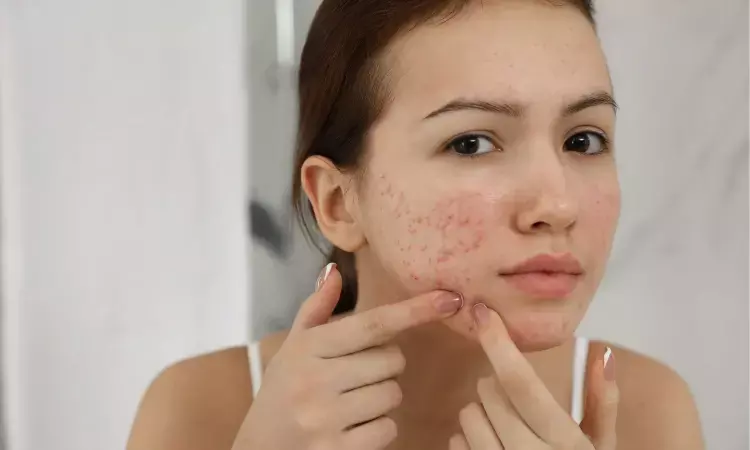- Home
- Medical news & Guidelines
- Anesthesiology
- Cardiology and CTVS
- Critical Care
- Dentistry
- Dermatology
- Diabetes and Endocrinology
- ENT
- Gastroenterology
- Medicine
- Nephrology
- Neurology
- Obstretics-Gynaecology
- Oncology
- Ophthalmology
- Orthopaedics
- Pediatrics-Neonatology
- Psychiatry
- Pulmonology
- Radiology
- Surgery
- Urology
- Laboratory Medicine
- Diet
- Nursing
- Paramedical
- Physiotherapy
- Health news
- Fact Check
- Bone Health Fact Check
- Brain Health Fact Check
- Cancer Related Fact Check
- Child Care Fact Check
- Dental and oral health fact check
- Diabetes and metabolic health fact check
- Diet and Nutrition Fact Check
- Eye and ENT Care Fact Check
- Fitness fact check
- Gut health fact check
- Heart health fact check
- Kidney health fact check
- Medical education fact check
- Men's health fact check
- Respiratory fact check
- Skin and hair care fact check
- Vaccine and Immunization fact check
- Women's health fact check
- AYUSH
- State News
- Andaman and Nicobar Islands
- Andhra Pradesh
- Arunachal Pradesh
- Assam
- Bihar
- Chandigarh
- Chattisgarh
- Dadra and Nagar Haveli
- Daman and Diu
- Delhi
- Goa
- Gujarat
- Haryana
- Himachal Pradesh
- Jammu & Kashmir
- Jharkhand
- Karnataka
- Kerala
- Ladakh
- Lakshadweep
- Madhya Pradesh
- Maharashtra
- Manipur
- Meghalaya
- Mizoram
- Nagaland
- Odisha
- Puducherry
- Punjab
- Rajasthan
- Sikkim
- Tamil Nadu
- Telangana
- Tripura
- Uttar Pradesh
- Uttrakhand
- West Bengal
- Medical Education
- Industry
JAK inhibitor use in skin conditions associated with elevated odds of the appearance of acne: JAMA

JAK inhibitors usage are increasing in atopic dermatitis, alopecia areata, psoriasis, and vitiligo. Studies suggest that JAK inhibitors may have widespread utility in dermatology, with early reports of success in several other conditions. JAK inhibitors can be taken orally or applied topically and are a promising new type of medication.
An Original Investigation published in JAMA Dermatology has identified higher rates of acne following treatment with a JAK inhibitor.
JAK inhibitors have shown promise as a treatment option for inflammatory conditions, but acne is a commonly reported side effect. However, there is limited information on the overall incidence of acne and how it varies between drug classes and underlying conditions. This study analyzed the risk of acne associated with JAK inhibitors across phase 2 and 3 placebo-controlled randomized clinical trials.
To assess the incidence of acne in phase 2 and 3 placebo-controlled randomized clinical trials (RCTs) of JAK inhibitors, the present study team searched the Ovid MEDLINE and PubMed databases for studies published in English from January 31, 2023. Studies included reported adverse events of acne. Two reviewers independently reviewed and extracted information from all included studies. The primary outcome of interest was the incidence of acne following JAK inhibitor use. We conducted a meta-analysis using random-effects models to pool the data from all included studies.
Key findings of this study are:
- Twenty-five unique studies included 54% male and 46 % female participants.
- The pooled odds ratio (OR) was calculated to be 3.83, with increased ORs for abrocitinib, baricitinib, upadacitinib, deucravacitinib and deuruxolitinib.
- Estimated ORs were higher across studies investigating the use of JAK inhibitors for treating dermatologic than nondermatologic conditions, as well as for JAK1-specific inhibitors, combined JAK1 and JAK2 inhibitors and tyrosine kinase two inhibitors.
They said in this study, we recorded the use of JAK inhibitors with elevated odds of acne. Patients should be appropriately counselled on the potential adverse effects of these medications before treatment initiation.
Further studies are needed to characterize the underlying mechanism of acne with JAK inhibitor use and identify best treatment practices.
Janus kinase (JAK) inhibitors are increasingly used for many dermatologic conditions. Acne vulgaris negatively impacts self-esteem, mental well-being, and social functioning. Furthermore, the potential for developing acne following treatment with JAK inhibitors is a concern, as this adverse effect may cause some patients to hesitate in adhering to their treatment plan.
Reference:
Martinez J, Manjaly C, Manjaly P, et al. Janus Kinase Inhibitors and Adverse Events of Acne: A Systematic Review and Meta-Analysis. JAMA Dermatol. Published online October 18, 2023. doi:10.1001/jamadermatol.2023.3830
BDS, MDS in Periodontics and Implantology
Dr. Aditi Yadav is a BDS, MDS in Periodontics and Implantology. She has a clinical experience of 5 years as a laser dental surgeon. She also has a Diploma in clinical research and pharmacovigilance and is a Certified data scientist. She is currently working as a content developer in e-health services. Dr. Yadav has a keen interest in Medical Journalism and is actively involved in Medical Research writing.
Dr Kamal Kant Kohli-MBBS, DTCD- a chest specialist with more than 30 years of practice and a flair for writing clinical articles, Dr Kamal Kant Kohli joined Medical Dialogues as a Chief Editor of Medical News. Besides writing articles, as an editor, he proofreads and verifies all the medical content published on Medical Dialogues including those coming from journals, studies,medical conferences,guidelines etc. Email: drkohli@medicaldialogues.in. Contact no. 011-43720751


